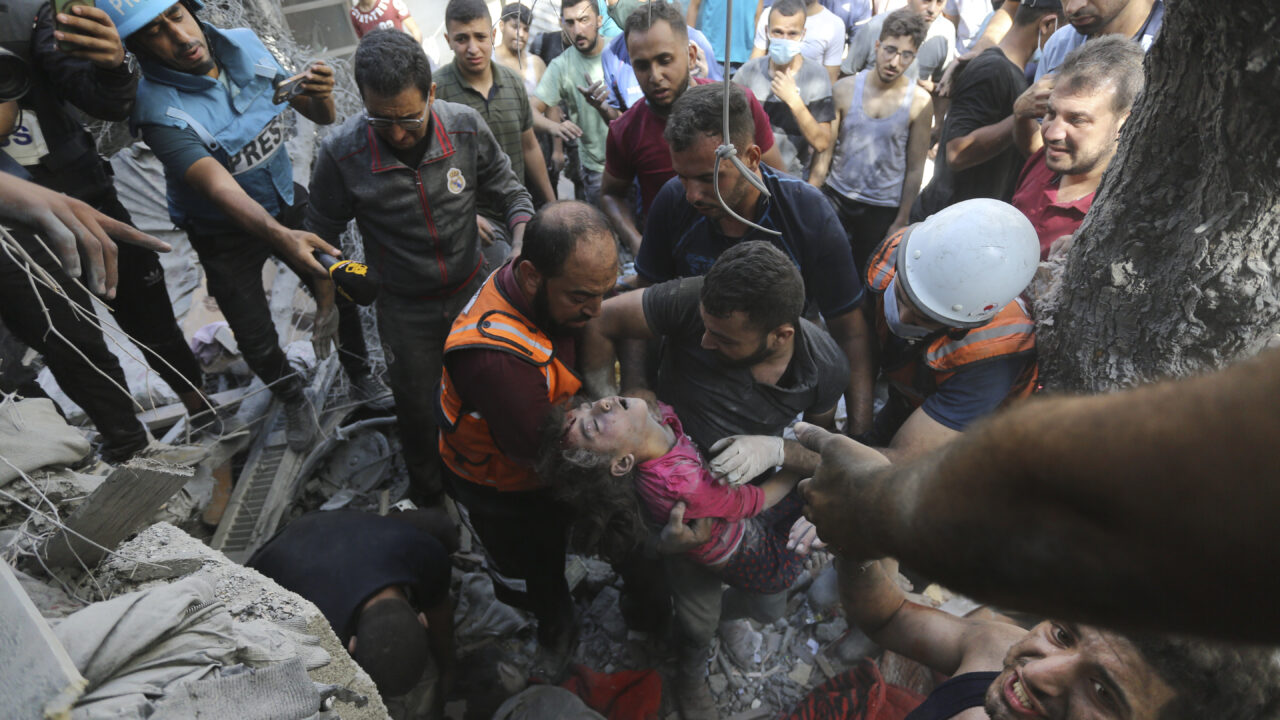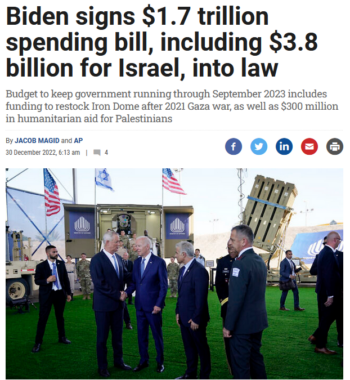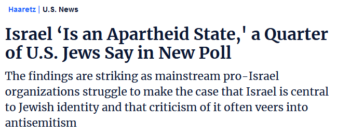Amid Horror in Gaza: ‘We Have to Do the Hard Work of Looking at Context’
Without understanding the bigger picture, there is no basis for stopping the violence on all sides. Palestinians rescue a child from under the rubble after Israeli airstrikes in Gaza City, Gaza Strip, Wednesday, Oct. 18, 2023. (Photo: Abed Khaled/AP)
Palestinians rescue a child from under the rubble after Israeli airstrikes in Gaza City, Gaza Strip, Wednesday, Oct. 18, 2023. (Photo: Abed Khaled/AP)
Janine Jackson interviewed the Institute for Policy Studies’ Phyllis Bennis about Gaza for the October 13, 2023, episode of CounterSpin. This is a lightly edited transcript.
Janine Jackson: As we record on October 11, headlines tell of horror and misery across Gaza as Israel rains airstrikes on hospitals, mosques and refugee camps; declares a complete siege blocking access to electricity, food and fuel; and musters for a possible ground offensive. An Israeli Defense Force spokesman is being quoted warning that scenes coming out of Gaza in coming days will be “difficult to understand and cope with.”
If the past is guide, scenes from Gaza will be especially difficult to understand if those presenting them avoid context—political, historical, human—in favor of storybook simplification and bloodthirsty cheerleading, followed by pronouncement by elites of rhetorical banalities endorsing injustice and indignity for millions.
With occasional exceptions, US corporate media’s distortions of Palestine/Israel make it harder to do what so many want, to see a way forward without violence, with justice.
Phyllis Bennis is Director of the New Internationalism project at the Institute for Policy Studies, and author of a number of books including Understanding the Palestinian/Israeli Conflict: A Primer, now in its seventh updated edition. She joins us by phone from Washington, DC. Welcome back to CounterSpin, Phyllis Bennis.
Phyllis Bennis: Great to be with you, Janine.
JJ: I’m hearing it said that while the specific nature of Hamas’s October 7 attacks was surprising to some, it’s not entirely true or useful to call the attacks “unexpected” in the way that we understand that word. What do people mean by that?
PB: I think the reference is to the understanding that resistance, including resistance violence, never just happens out of thin air. It happens in response to something. It happens in the context of something.
And if we’re serious about preventing acts of violence in the future, understanding the acts of violence that have already occurred, we have to be prepared to do the hard work of looking at context, looking at root causes, something that at moments of crisis, which for Israelis, this is clearly a moment of unexpected crisis, but for people in this country as well, it’s crucial that we take those hard steps to figure out what gives rise to this. Because otherwise we’re simply mouthing platitudes of condemnation.
Condemnation of violent attacks on civilians is completely appropriate. Some of the acts of some of the Hamas militants were in complete violation of international law, and should be condemned. And it’s also true that they didn’t just happen. They happened in the context of 75 years of oppression of Palestinians, decades of an apartheid system.
And crucially, in Gaza, where Hamas was born in 1987—with, we should note, significant Israeli assistance at the time—the people in Gaza, the 2.2 million people who live in that enclosed, open-air prison, if you will, one of the most crowded places on the face of the earth, have lived under a state of siege that was imposed by Israel in 2007.
Ironically, when we heard this horrific call from the minister of defense from Israel yesterday—who said, we are going to impose such an incredibly tight siege, there will be nothing that gets in, no food, no fuel, no water, no electricity—this was a call to essentially commit genocide, knowing that with the sealing off of the last remnants of the siege that has already been in place, they are predicting that the impact of their policy will be mass starvation, mass thirst, mass death from injuries that the hospitals will be unable to treat, because the hospitals won’t have fuel for their generators, which they rely on because there’s already insufficient electricity available in Gaza.
In an article I’m just writing, I quote a Gaza woman, 72-years-old, who said, “Years ago, we had electricity 24 hours a day and took that for granted. Now that seems like a dream.” And this was last June, before this new siege. So what they’re talking about with this new siege is almost like a quantitative escalation of what is already in place.
I found out today, and I’ve got to say, as familiar as I am with the human rights violations in Gaza, this one shocked me: As of May of this year, 20% of all children in Gaza are stunted by the age of two. I had no idea that was the case, and yet it is. And that’s before this level of punishment.
So all of those things have to be taken into account to understand—not to justify, not to ever justify—the killings of civilians, the killings of children and old people; unacceptable, should be condemned; and we have to understand from where that comes, why these things happen. Otherwise, we have no basis to figure out a strategy to stop the violence on all sides.
JJ: I do want to talk about stopping the violence, but just some definitions as we go forward. I have been surprised to read things like Israeli Defense Minister Yoav Gallant, in announcing the siege, say, “We are fighting human animals and we are acting accordingly.” And then you might say, well, that’s just rhetoric. But then we also have IDF officials saying, according to Ha’aretz, out loud, that with Israeli airstrikes, “the emphasis is on damage and not on accuracy.”
Isn’t this unlawful collective punishment? Why does this become, in reporting, something that “some critics” say “might possibly” be “seen as” a war crime?
PB: These are clear war crimes. These are not potential, maybe, somehow war crimes. These are clear, unequivocal war crimes. This is the kind of crime for which the Geneva Conventions, of which Article 33 is a specific prohibition of collective punishment—it’s exactly these kinds of actions for which those articles were drafted. So, yes, these are violations of international law, period, full-stop.
It is not, however, surprising or new that international law is not taken into account when its violations are committed by close allies of the United States, and Israel is at the top of the list for that kind of protection.
This is an old story. International law is not imposed in the way that we hear it consistently imposed, appropriately, for Russian violations, for instance, in Ukraine. Those violations have been massive, and appropriately they’ve been called out. We can identify the hypocrisy of the US being the one to call them out, given US histories of violations of international law. But nonetheless, it’s accurate to call out those violations.
Times of Israel (12/30/22)
The notion that somehow the Israeli actions, collective punishment, failure to distinguish between civilians and fighters—all these things are direct violations of international law. They are war crimes. And United States support for Israel goes far beyond the $3.8 billion a year that we give as a baseline to the Israeli military, but also includes the protection of Israel at the United Nations from ever being held accountable, the insurance at the International Criminal Court that Israeli officials, whether political or military officials, are never held accountable.
This is unconscionable, and makes the United States, and frankly us as taxpayers, makes us a component of that policy of apartheid and oppression. It makes us complicit. We are enabling. That $3.8 billion—which is a pittance of our military budget, which is approaching a trillion dollars this year, 53 cents of every federal discretionary dollar goes directly to our military—but aside from that, we are paying 20% of the entire Israeli military budget. We don’t do that with any other country.
JJ: I just read James Zogby saying that the State Department deleted two initial statements they had put out, urging restraint and protection of civilians, and changed them to offering Israel full US support. And a lot of the talk that we hear is about what Palestinians should do, or what Israel should do. And that kind of talk is a little bit abstract, and it’s maybe a little easier for US citizens to do, than to grapple with what we as US citizens should and could be doing. So I wanted to ask you just about that. Besides lamenting, besides condemning and looking on in horror, what place is there for us as US citizens?
PB: Ironically and perhaps somewhat sadly, given the depth of this crisis, what lays ahead, I’m afraid, both in numbers and in brutality, is going to be even worse than the brutal and high numbers of dead and injured on both sides that have happened already. What we’re going to see in Gaza, as the Israeli bombardment escalates, as I have no doubt it will in coming days, is going to be disastrous, and it means we have a real obligation.
What we need to be doing, I think, is to stop the US government, from doing what all of its institutional instincts—if I can coin a phrase like that, I’m not even sure that makes sense, but I think listeners will maybe understand what I mean. It’s as if the institution of Congress, the institution of the State Department, the institution of the White House react in certain ways when the perception is that Israel, for the first time, is facing the kind of horror that it has in fact inflicted on Palestinians so many times before. And that means that we have an obligation to escalate the pressure that we’ve already been calling for on our members of Congress to stop saying we should send more weapons.
There was something very interesting, in Biden’s speech on October 11, he said two things that I found very useful, ironically enough. In one of them, he said that he had just gotten off the phone with Prime Minister Netanyahu in Israel, and he said, “I told him if the United States experienced what Israel is experiencing, our response would be swift, decisive and overwhelming.” And I thought, you know, a lot of people are saying this is Israel’s 9/11. And we did experience that, and our response was swift and decisive and overwhelming. And it failed. Our response was war in Afghanistan and then war in Iraq, and they both failed.
He went on to say, “We also discussed how democracies like Israel and the United States are stronger and more secure when we act according to the rule of law.” He was right. They are. And we didn’t. And so it failed.
It was an extraordinary moment. And I don’t think anybody in the commentariat, if you will, of the mainstream press, caught that, to say that that’s exactly what we did in 9/11, and it failed. It failed to do any of the things we claimed it would do.
JJ: It’s remarkable, and really reflects the kind of funhouse mirror understanding of, really, the very recent history that we’ve all lived through. And it brings me to this final question, because, in many ways, in terms of media, I almost could have re-aired an interview that we did with you five years ago or 15 years ago, in terms of missing context, of dehumanization. But reality and opinion have changed, are changing, in this country. There’s a growing openness to criticism of Israel and the apartheid state. And I just want to ask you, do you think that this might redirect or weaken that growing openness, or what do you think?
PB: You know, Janine, I think you raise a really crucial point. And from the moment that this crisis, this particular crisis, erupted on Saturday morning, I’ve been worried about exactly that. I’ve been writing a lot, talking a lot about the success of our movement, the movement for Palestinian rights, how we have managed to change the discourse. It hasn’t been easy. It hasn’t been quick, but over the last 20, 25 years, we’ve seen an extraordinary shift, an enormous shift in the public discourse, a very significant shift in the media discourse—not as great as at the public level, but still—and the beginnings of a shift at the political/policy discourse level.
Ha’aretz (7/13/21)
It’s been huge. You have things like, if we look at the polls, in a recent poll, there was evidence that 25% of American Jews believe that Israel is an apartheid state. Thirty-eight percent of young Jews believe that, and 44% of Democrats said they think Israel is like apartheid. Those are huge shifts. They are huge changes. And I think that’s very key.
We see at the policy level, we saw in 2021 when Israel attacked Gaza, not even as bad as this, but in a horrific way that killed a number of people in Gaza in bombing, aside from the fact that several groupings of congresspeople and senators were demanding a ceasefire at a time when their own president, their own party was refusing to support a ceasefire.
More important than any of those, I thought, was a group of 500 former Democratic campaign staffers, the people who had actually put Biden in office, who headed up the statewide and citywide campaigns, 500 of them signed off on an incredible letter that talked about 75 years of oppression against Palestinians, etc., and called for a ceasefire.
And what it said, aside from the text of the letter itself, it meant that those 500 campaign workers, who have to find a new job every year in a new campaign, had come to the conclusion that criticizing Israel is no longer political suicide, that it was not going to stop them from getting a job. And I thought that was an incredible example of how this discourse shift has gone forward.
Now the danger is, of course, that with the emotional response to what has gone on in the last several days—and we should be clear, we saw this in earlier examples, in Syria and elsewhere, that televised and video versions of up-close and personal violence are far more passionately responding than what happens when a pilot drops a bomb, which probably kills far more people. Not surprisingly; it’s a very human response, but it’s a misleading response.
And when it keeps getting repeated, over and over again, not just in social media, but in mainstream media as well, some of which have been false videos as well, that are being circulated around and repeated in some mainstream outlets, there is a level of emotional response that’s much harder to engage with than the responses to the far greater wholesale killing, if you will, where far more people get killed, under US bombs or under Israeli missiles, than ever get killed by individual acts of violence that are so horrific to watch or to even contemplate.
So we’re up against a big new challenge right now, to at least not lose those advances that we’ve made in how the discourse goes forward. It’s not going to be easy, but it’s not going to happen by itself. It’s something that we’re going to have to work on. And organizations like FAIR play a huge role in reminding us of that, reminding us of how the media discourse shapes how we come to understand it.
The Hill (10/8/23)
One of the things I’ve been talking about a lot in the last few days is this notion that our understanding of history and our understanding of reality is shaped by when we start the clock. If we started the clock on Saturday morning, we would have one version of what happened, when those hundreds of Hamas fighters invaded Israel, broke out of the walled prison that was Gaza, and began to attack, not only military installations and military officials, but unfortunately attacked civilians as well, in a horrific way. That’s one narrative.
The broader narrative, if we start the clock a week earlier, we would hear an entirely different thing of how things started. We could move the clock back. We could move back to the last attack on Gaza in 2021. We could move it back to the beginning of the siege of Gaza of 2006 and 2007. We could move it back to the beginning of the occupation of Gaza in 1967. So when we start the clock determines how we understand what we’re seeing in front of our own eyes.
JJ: We’ve been speaking with Phyllis Bennis from the New Internationalism project at the Institute for Policy Studies. You can find her recent piece, “As Israel and Gaza Erupt, the US Must Commit to Ending the Violence—All the Violence,” at TheHill.com. Phyllis Bennis, thank you so much for joining us this week on CounterSpin.
PB: Thank you, Janine. I’m glad to have been with you.
Your support matters…Independent journalism is under threat and overshadowed by heavily funded mainstream media.
You can help level the playing field. Become a member.
Your tax-deductible contribution keeps us digging beneath the headlines to give you thought-provoking, investigative reporting and analysis that unearths what's really happening- without compromise.
Give today to support our courageous, independent journalists.









You need to be a supporter to comment.
There are currently no responses to this article.
Be the first to respond.